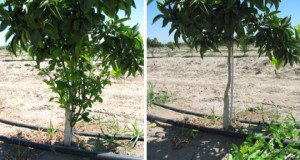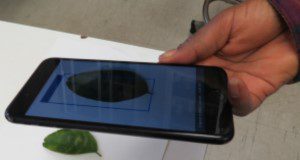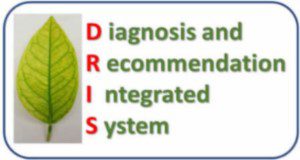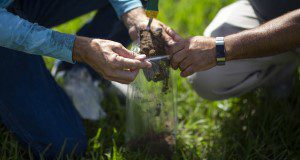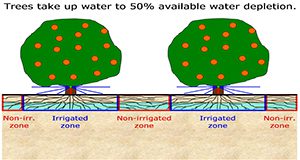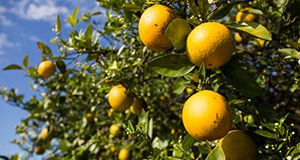Canopy management is a useful tool to induce precocity and maintain high production of optimum-sized, high-quality fruit. The aim of this new 8-page publication of the UF/IFAS Department of Soil and Water Sciences is to provide growers with practical tools with which to manage their trees for maximum fresh-fruit yield, quality, and profitability. Written by Andrew Krajewski, Arnold Schumann, Tim Ebert, Chris Oswalt, Rhuanito S. Ferrarezi, and Laura Waldo.
https://edis.ifas.ufl.edu/ss698
Tag: Arnold Schumann
Computer Tools for Diagnosing Citrus Leaf Symptoms (Part 2): Smartphone Apps for Expert Diagnosis of Citrus Leaf Symptoms
Visual identification of nutrient deficiencies in foliage is an important diagnostic tool for fine-tuning nutrient management of citrus. This new 2-page article describes a new smartphone app that uses a trained neural network to identify disease and pest symptoms on citrus leaves through your phone’s camera. Written by Arnold Schumann, Laura Waldo, Perseveranca Mungofa, and Chris Oswalt, and published by the UF/IFAS Department of Soil and Water Sciences.
https://edis.ifas.ufl.edu/ss691
Computer Tools for Diagnosing Citrus Leaf Symptoms (Part 1): Diagnosis and Recommendation Integrated System (DRIS)
This new 2-page article provides instructions for using the Diagnosis and Recommendation Integrated System, or DRIS, a web tool designed for analyzing leaf nutrient concentrations of Florida citrus. Written by Arnold Schumann and published by the UF/IFAS Department of Soil and Water Sciences.
https://edis.ifas.ufl.edu/ss683
Soil Sampling Procedures
To achieve optimal grove nutrition, citrus growers must test grove soil before beginning any fertilization program. Standard procedures for sampling, preparing, and analyzing soil should be followed for meaningful interpretations of the test results and accurate recommendations. This new two-page fact sheet, published by the UF/IFAS Department of Soil and Water Sciences, provides illustrated soil sampling procedures and tables to aid in basic interpretation of lab results. Written by Davie Kadyampakeni, Kelly Morgan, Arnold Schumann, and Rhuanito S. Ferrarezi.
https://edis.ifas.ufl.edu/ss667
Irrigation Management of HLB-Affected Trees
Water is a limiting factor in Florida citrus production due to non-uniform rainfall distribution and the low water-holding capacity of our sandy soils. Because periods of low rainfall coincide with critical stages of citrus production, additional irrigation is necessary to reduce the negative effects of water stress. This 6-page document covers recent findings on water use of trees affected by citrus greening and the impact this would have on irrigation management considerations. Written by Davie Kadyampakeni, Kelly Morgan, Mongi Zekri, Rhuanito Ferrarezi, Arnold Schumann, and Thomas A. Obreza and published by the UF/IFAS Department of Soil and Water Sciences, October 2017.
http://edis.ifas.ufl.edu/ss659
Citrus Irrigation Management
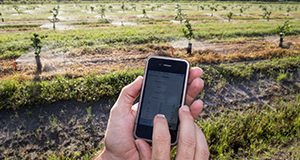 The chapter on irrigation management of citrus is largely taken from guidelines provided in SL253 on trees prior to Huanglongbing (HLB) prevalent conditions. A section has been added to cover recent findings on water use of trees affected by HLB and the impact this would have on the irrigation management considerations. This 6-page fact sheet discusses water supply, allowable soil water depletion, irrigation scheduling, soil moisture measurement, water budgeting, smartphone apps, irrigation strategies to improve nutrient uptake and reduce leaching, and irrigation management considerations for HLB-affected trees. Written by Davie Kadyampakeni, Kelly Morgan, Mongi Zekri, Rhuanito Ferrarezi, Arnold Schumann, and Thomas Obreza, and published by the UF/IFAS Soil and Water Sciences Department, September 2017.
The chapter on irrigation management of citrus is largely taken from guidelines provided in SL253 on trees prior to Huanglongbing (HLB) prevalent conditions. A section has been added to cover recent findings on water use of trees affected by HLB and the impact this would have on the irrigation management considerations. This 6-page fact sheet discusses water supply, allowable soil water depletion, irrigation scheduling, soil moisture measurement, water budgeting, smartphone apps, irrigation strategies to improve nutrient uptake and reduce leaching, and irrigation management considerations for HLB-affected trees. Written by Davie Kadyampakeni, Kelly Morgan, Mongi Zekri, Rhuanito Ferrarezi, Arnold Schumann, and Thomas Obreza, and published by the UF/IFAS Soil and Water Sciences Department, September 2017.
http://edis.ifas.ufl.edu/ss660
Fertigation for Citrus Trees
Microirrigation is an important component of citrus production systems in Florida. For citrus trees, microirrigation is more desirable than other irrigation methods for several reasons: water conservation, fertilizer management efficiency, and freeze protection. Research has shown that when microirrigation systems are properly managed, water savings can amount to as much as 80% compared with subirrigation and 50% compared with overhead sprinkler irrigation. Research has also shown the important advantage of microsprinklers for freeze protection of citrus. This 4-page fact sheet discusses fertilizer solubility and some common fertigation materials. It also offers a fertigation summary. Written by Mongi Zekri, Arnold Schumann, Tripti Vashisth, Davie Kadyampakeni, Kelly Morgan, Brian Boman, and Tom Obreza, and published by the UF Horticultural Sciences Department, September 2017.
http://edis.ifas.ufl.edu/hs1306
Citrus Nutrition Management Practices
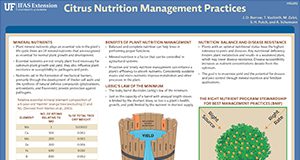
A new two-page fact sheet has been published by the Horticultural Sciences Department and the UF/IFAS Citrus Research and Education Center about citrus nutrition management practices. It was written by J.D. Burrow, T. Vashisth, M. Zekri, S.H. Futch, and A. Schumann.
http://edis.ifas.ufl.edu/hs1292
How to Characterize Soil Variability in Florida Citrus Groves as It Relates to Tree Growth and Yield (SL556/SS557)
 Non-uniform tree growth and fruit yield are very common throughout many Florida citrus groves, but variable groves are typically managed as if they were uniform. This 4-page fact sheet provides information about the relationship between soil variability and citrus production, proposes recommendations for soil sampling that account for spatial variability, and suggests site-specific management practices for variable Florida citrus groves. Written by Kirandeep K. Mann, Arnold W. Schumann, Thomas A. Obreza, Willie G. Harris, and Jerry B. Sartain, and published by the UF Department of Soil and Water Science, January 2011.
Non-uniform tree growth and fruit yield are very common throughout many Florida citrus groves, but variable groves are typically managed as if they were uniform. This 4-page fact sheet provides information about the relationship between soil variability and citrus production, proposes recommendations for soil sampling that account for spatial variability, and suggests site-specific management practices for variable Florida citrus groves. Written by Kirandeep K. Mann, Arnold W. Schumann, Thomas A. Obreza, Willie G. Harris, and Jerry B. Sartain, and published by the UF Department of Soil and Water Science, January 2011.
http://edis.ifas.ufl.edu/ss557
HS1181 Mineral Nutrition Contributes to Plant Disease and Pest Resistance
HS1181, a 5-page illustrated fact sheet by Timothy M. Spann and Arnold W. Schumann, provides a summary of plant mineral nutrition, discussing how nutrient levels may affect plant growth and potential susceptibility to plant diseases and pests. Published by the UF Department of Horticultural Sciences, July 2010.
http://edis.ifas.ufl.edu/hs1181
AE444 Variable Rate Technology for Florida Citrus
AE444, a 5-page illustrated fact sheet by Reza Ehsani, Arnold Schumann, and Masoud Salyani, describes this important site-specific management component of precision agriculture which provides economic benefits to growers while reducing the application of agrochemicals. Includes references. Published by the UF Department of Agricultural and Biological Engineering, January 2009.
http://edis.ifas.ufl.edu/AE444
